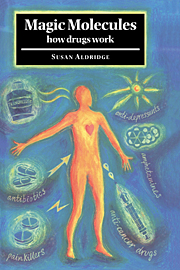Book contents
- Frontmatter
- Contents
- List of illustrations
- Acknowledgements
- Introduction
- 1 How drugs work
- 2 From penicillin to Prozac: introducing pharmaceutical drugs
- 3 Fighting infection
- 4 The hormonal revolution
- 5 Cardiovascular drugs: protecting the heart and brain
- 6 The problem of pain
- 7 The cancer challenge
- 8 Drugs for the mind
- 9 Drugs of recreation and addiction
- 10 Natural alternatives: vitamins, minerals and herbs
- 11 In the pipeline: gene-based medicine
- Bibliography
- Index
7 - The cancer challenge
Published online by Cambridge University Press: 05 August 2012
- Frontmatter
- Contents
- List of illustrations
- Acknowledgements
- Introduction
- 1 How drugs work
- 2 From penicillin to Prozac: introducing pharmaceutical drugs
- 3 Fighting infection
- 4 The hormonal revolution
- 5 Cardiovascular drugs: protecting the heart and brain
- 6 The problem of pain
- 7 The cancer challenge
- 8 Drugs for the mind
- 9 Drugs of recreation and addiction
- 10 Natural alternatives: vitamins, minerals and herbs
- 11 In the pipeline: gene-based medicine
- Bibliography
- Index
Summary
Cancer is probably the biggest current challenge to the pharmaceutical industry. One person in three will be diagnosed with cancer during their lifetime in the Western world and fewer than half can expect a complete cure. This is despite the hundreds of millions of dollars spent on research and treatments over the last 30 years or so.
And cancer is an increasing problem; the World Health Organization predicts a 40 per cent increase in cancer cases over the next 25 years in the West, and a doubling in developing countries. According to a recent report commissioned by the charity Macmillan Cancer Relief, one Briton in two can expect to contract cancer in their lifetime by 2018 (compared to one in three today).
There are also marked trends in certain types of cancer. Currently lung cancer is the commonest fatal cancer in men. It could be overtaken by prostate cancer by the next century, however. Male lung cancer rates are falling, while prostate cancer has doubled over the last 20 years. On the other hand, female lung cancer is increasing. It could soon overtake breast cancer as the leading cause of cancer death in women. Malignant melanoma, a skin cancer, is on the increase in both men and women, while stomach cancer continues to decrease.
Doctors have a good idea what lies behind at least some of these trends; food preservatives (despite their bad press in some quarters) are generally accepted to protect us from toxins in food that could otherwise trigger a stomach cancer. Changes in the incidence of lung cancer can largely be accounted for by changes in smoking behaviour in men and women.
- Type
- Chapter
- Information
- Magic MoleculesHow Drugs Work, pp. 159 - 176Publisher: Cambridge University PressPrint publication year: 1998



